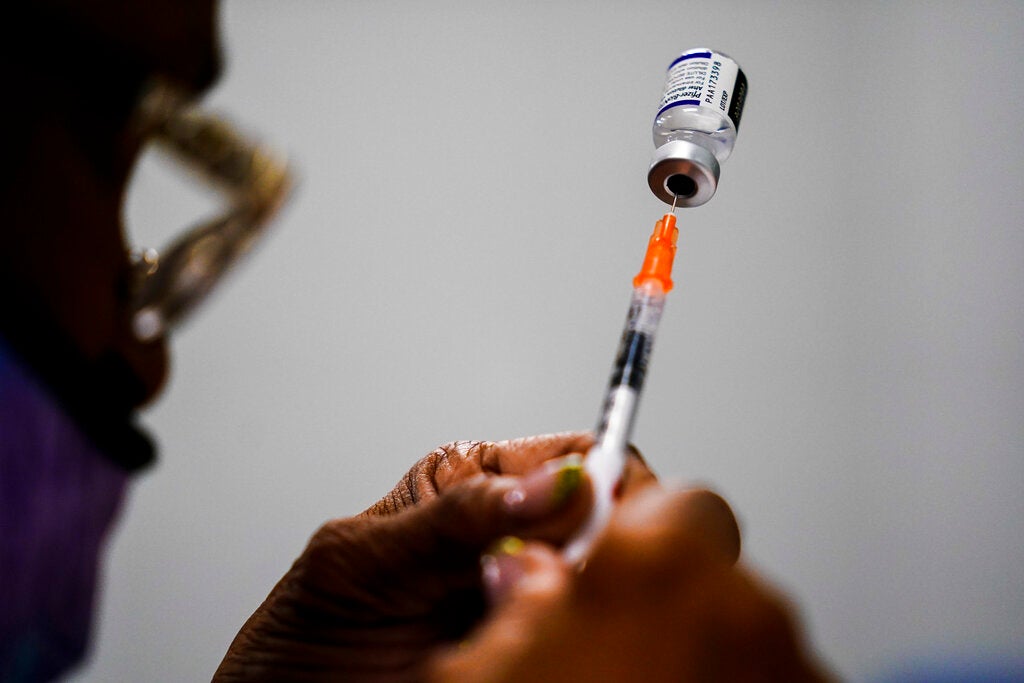Second COVID-19 booster shot increases protection against Omicron variants: U.S. study
TORONTO (CTV Network) — A study looking at the effectiveness of fourth doses of COVID-19 vaccines, run by the U.S. Centers for Disease Control and Prevention (CDC), has found that a second booster shot of an mRNA vaccine has significant effectiveness against severe illness with some Omicron variants.
The study looked at more than 200,000 emergency department visits and 58,000 hospitalizations with COVID-19 to assess effectiveness against the variants Omicron BA.1 and BA.2/BA.2.12.1. The newer strains of BA.4 and BA.5, which are thought to be driving the current wave of COVID-19 cases in Canada and other regions, were not part of the study.
After the first booster shot, vaccine effectiveness against severe illness with Omicron variants BA.1 and BA.2/BA.2.12.1 was found to be just 68 per cent in the first six months, declining to 52 per cent after that point, according to the CDC.
But after a second booster shot, the CDC found the effectiveness against severe illness with these variants increased to 80 per cent during the first six months. Data after the first six months of a fourth dose isn’t available yet.
Fourth doses were also associated with a reduction of hospitalization and emergency department visits related to BA.1 and BA.2/BA.2.12.1.
This is one of the first investigations into the impact of second booster shots when fighting Omicron variants, according to the CDC.
Shaun Grannis, vice-president for data and analytics at the Regenstrief Institute and professor of family medicine at Indiana University School of Medicine, as well as co-author of the study, said in a press release that these findings may help some people answer the question of whether they should get a second booster shot.
“The data clearly show that a second booster significantly increases vaccine effectiveness against these variants — which while no longer dominant in many areas, are still present,” he said. In late April, the BA.2 sub lineage accounted for the majority of cases in the U.S.
“As we go into the fall, when viruses typically pick up, we want to encourage people who are eligible for a second booster to be proactive and to strongly consider getting one because it will provide greater protection,” he added. “It will reduce the need for COVID-19-related emergency department visits and hospitalizations.”
In the U.S., this eligibility refers to people over the age of 50 years old, as well as younger people who are moderately to severely immunocompromised, according to the CDC’s current recommendations. This new study only included those that fell within this group.
But in Canada, while most provinces or territories are offering second booster shots to vulnerable populations such as the immunocompromised or elderly, some regions have expanded that eligibility to include more members of the general population.
Nunavut, Yukon, Quebec and Ontario have expanded eligibility to those 18 and older, while Prince Edward Island and British Columbia are permitting those 12 years old and up to receive a second booster shot, although eligibility differs between these provinces based on how long ago a person’s third shot has been.
The CDC’s report was published Friday in their Morbidity and Mortality Weekly Report.
They used data from 10 states and 19 institutions, including academic organizations as well as public and private clinical and research organizations, between December 2021 and June 2022.
Vaccine effectiveness was assessed by comparing the odds of hospitalization or emergency department visits between those vaccinated with one, two, three or four doses, as well as those who are completely unvaccinated.
Vaccine effectiveness in preventing hospitalization with COVID-19 was 80 per cent after a fourth dose, the study found, while vaccine effectiveness against emergency department visits increased from 32 per cent after the third doses to 66 per cent after fourth doses.
Of the Omicron variants included, there is slightly more immune escape associated with BA.2.12.1., the report stated, meaning that this variant was more likely than the others in the study to be able to evade the immunity granted by vaccination and infect people more easily.
The report noted that they did not factor in previous COVID-19 infections into their data from patients, which could have an impact on their immunity. They also did not confirm exactly which variant patients had through lab testing, but sorted them based on timing of when patients tested positive and which variants were known to be dominant (making up more than 75 per cent of cases) in that region during that time period.
Grannis noted in the release that any boost in effectiveness against serious illness that could occupy hospital resources was a positive sign.
“From a population health perspective, the protection supplied by the second booster helps ensure that healthcare resources are capable of responding to the full spectrum of medical needs, reducing the chance of overwhelming health systems with COVID-19-related disease,” he said.



